Dentures – Fort Worth, TX
Regain a Complete and Confident Smile
Are you missing some or all your teeth? If so, you’re certainly not alone. Studies reveal that 120 million Americans are missing at least one tooth, and more than 36 million don’t have any teeth at all. Thankfully, you don’t have to let tooth loss hold you back in life. Dr. Karen Littlefield Neil, DDS can help you regain a complete and confident smile with partial or full dentures in Fort Worth! To get started, give us a call today to schedule your consultation.

Why Choose Dr. Karen Neil, DDS For Dentures?
- #1 Dentist with Over 3 Decades of Experience
- #2 Traditional & Implant Dentures Available In-House
- #3 Dental Insurance Welcome & Flexible Financing Available
Who’s a Good Candidate for Dentures?

One of the reasons why dentures have remained one of the most popular tooth replacement options available is because of how widely available they are. Practically any adult with stable oral health who is missing teeth can qualify for dentures. Before we fit you for your new smile, we’ll check for any oral health issues like gum disease and tooth decay and ensure those are treated beforehand if necessary. After all, we want your new smile to be healthy as well as beautiful!
Effects of Missing Teeth

Teeth can be lost in a variety of different ways. The most common causes of tooth loss include tooth decay, gum disease, and injury. According to the American Academy of Periodontology, there are several negative consequences of missing teeth, including facial sagging, difficulty speaking, trouble eating, and lower self-esteem. By replacing your missing teeth with dentures, you can improve all of these areas of your life!
What Qualifies You for Dentures?

Dentures are ideal for patients who have experienced significant tooth loss yet have healthy gum tissue and a sufficient jawbone. Those who get dentures must also be committed to their dental health routine and willing to properly care for their new smile.
The number of teeth you are missing will ultimately determine which type of denture is best for you. One of the great things about dentures is the fact that they are more affordable than other tooth replacement options, making them great for patients who are unable to invest much money into their smile at this time.
Alternative Tooth-Replacement Options

If you aren’t a good candidate for dentures or they aren’t something that you are interested in, you may want to consider these other tooth replacement options that we offer:
- Dental Bridges: A dental bridge works by “bridging” the gap where you are missing your tooth. The replacement tooth is supported by crowns that are secured to your adjacent teeth. Dental bridges are ideal for patients who are only missing one or a few teeth. They require healthy teeth surrounding the missing tooth/teeth to support the bridge.
- Dental Implants: Dental implants are titanium, screw-like posts that are surgically placed in the jawbone to support replacement teeth. To be a good candidate for this method, you must have a solid, sufficient jawbone. This option is more costly than traditional dentures, but it’s permanent.
How Dentures are Made

Before you try dentures yourself, you may want to learn how they’re made. Knowing their creation process can help you see their value. Still, you likely don’t know where to start your fact-finding. Dr. Neil and her team are thus here to help! Listed below, you’ll find a summary of how dental labs make dentures. It should provide the relevant details you need. So, go ahead, keep reading, and call our office soon.
What are Dentures Made Of?

No matter the type, each denture has a base and artificial teeth. These latter parts ensure the restoration works well. As proof, consider their features as described:
- Denture Base – A denture's base supports its artificial teeth, keeping the latter in place. As such, it's often made from acrylic, nylon, resin, or metal. Full dentures often use acrylic, though, since this plastic can match your gums. Meanwhile, partials tend to use metal clips with an acrylic base.
- Artificial Teeth – Per their name, the artificial teeth are a denture’s pearly whites. They're made from either lifelike resin or porcelain. Even so, porcelain is more popular due to how it looks and feels. It’s typically only suggested for full dentures.
The Denture Creation Process

In the end, each denture is custom-made for the patient’s mouth. That means making one involves a multi-step process. To be specific, these steps are:
- Step 1 : Our dentists will take a dental impression. From there, they’ll make a plaster model that matches the final denture’s size and shape.
- Step 2 : The plaster model is sent to a lab that makes a denture. Lab technicians will then create a wax gumline by using it.
- Step 3 : The lab will set artificial teeth in the wax base. The resulting prototype will be used for the finished denture.
- Step 4 : The wax denture will go to the dentist for a fitting. Once tested, it’ll be returned to the dental lab to finish the final restorations.
- Step 5 : A worker will boil the denture to remove its wax. They’ll then place the prosthetic in a flask. Said flask will receive plaster and sit in hot water.
- Step 6 : A separator will go into the plaster layer, preventing the acrylic from sticking. This acrylic will be injected into the flask to replace the wax.
- Step 7 : The plaster will be removed to reveal the denture. The restoration will then be placed in a bath to remove their residue.
- Step 8 : Excess acrylic will be cut from the denture. Said denture will then be polished.
- Step 9 : The patient will have the denture fitted. At that time, the dentist will adjust your denture to work smoothly.
Adjusting to Your New Dentures

Ultimately, you may get aches when first wearing dentures. You might even feel sore and struggle to eat or speak. That said, these effects are normal. They’ll soon fade as you adjust to the dentures. Afterward, the new teeth should feel like a regular part of your smile.
Naturally, you could speed up the adjustment process. One way is to eat soft foods for a week, which won’t irritate your gums. Other examples include working your facial muscles or applying adhesives. These practices will ease your pain, ensuring your dentures feel more familiar.
If your discomfort persists, call us at once. Your denture may need further adjustment.
Types of Dentures

Once you’ve been cleared as a good candidate for dentures, we’ll work with you to determine which type of denture best suits your needs. Depending on your unique situation and preferences, that could be any of these three:
Partial Dentures

Partial dentures are ideal for patients missing a few teeth throughout their mouth. The gum-colored acrylic base is set with just the teeth you need to replace and is designed to fit precisely around and between your remaining teeth. Small metal clasps and wires wrap around your natural tooth structure to help hold it in place.
Full Dentures

When you think of dentures, an image of full dentures is likely what comes to mind. With this reliable restoration, we can restore an entire arch of missing teeth all at once. The natural-looking replacement teeth are set into a gum-colored base that is carefully crafted to fit snugly but comfortably over your gums. The close fit that’s create generates a strong natural suction that keeps your denture stable.
Implant Dentures

As an alternative to traditional removable dentures, we can pair your partial or full denture with dental implants for optimal results. Instead of relying on wires, suction, or adhesive to stay in place, implant dentures are anchored into your jawbone with small metal posts called dental implants. This gives them unmatched functionality, stability, and longevity. During your consultation, we’ll help you determine if you’re a candidate for dentures.
The Benefits of Dentures

If you’ve been struggling with tooth loss, you probably know just how difficult it can be to perform daily tasks like eating and speaking, or how daunting it can be to smile comfortably in front of strangers. Needless to say, this can affect your general wellness, in addition to your happiness! However, by restoring your smile with dentures, you’ll gain access to all sorts of benefits that will vastly improve your day-to-day life. Here’s a closer look at just a few of them:
Psychological Benefits
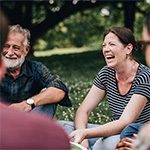
Losing any number of teeth can have a seriously negative impact on your self-confidence, as well as your quality of life. Many patients who’ve suffered tooth loss end up experiencing increased social anxiety as a result, as well as sadness or even depression. This is no way to live! By renewing your smile with dentures, you can avoid worrying about the way you look when you eat, speak, laugh, or smile. The boost in self-esteem provided by dentures will work wonders for your mental state.
Clearer Enunciation

Your teeth play a very important role when it comes to speech; you wouldn’t be able to make certain sounds or pronounce certain words without them! Patients with missing teeth tend to develop speech impediments and struggle to communicate as effectively as they used to. But since dentures restore your entire smile, they also make it easier for tooth loss patients to converse with others again. Just note that normally, it takes about a month or so of wearing dentures to become accustomed to speaking with them; however, with practice, you’ll be able to speak fluently in no time at all.
Improves Nutrition
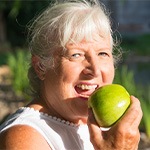
Tooth loss also impacts one other important oral function; your ability to eat. If you aren’t able to effectively chew your meals like before, there’s a high chance you might experience problems like indigestion and malnutrition – not to mention, it’s a choking hazard! By rebuilding your smile with dentures, you’ll regain your ability to thoroughly bite, tear, and chew into food, expanding your diet and allowing you to enjoy all kinds of hearty, tasty choices.
Preserves Oral Health

Whenever you’re missing teeth, did you know that your remaining teeth are at a higher risk of falling out? This is due to dental drift, or the tendency for teeth to shift towards the open gaps that form when teeth are lost. Not only can this cause additional missing teeth, but it can also make the jawbone begin to deteriorate and lose mass in those areas since there are no longer teeth that require nutrients and stimulation. Dentures can help to support these positions. Of course, your dentures also can withstand more of the pressure of chewing, meaning that you’ll avoid further wear and tear on your remaining natural teeth!
Expands Opportunities

Your smile is a critical asset when it comes to making first impressions on dates, during job interviews, and any other time you meet someone. In fact, most people agree that someone’s smile is the very first feature they notice upon greeting them. This means that having a complete smile can give you an advantage when it comes to the professional world; research shows that poor oral health is often associated with a lower probability of being employed. For this reason alone, it’s incredibly worthwhile to rebuild your smile with dentures, regain your confidence, and take professional opportunities head-on!
Understanding the Cost of Dentures

The cost of dentures will vary from person to person because every case is unique. There are numerous factors that contribute too the price. The only way to find out exactly how much your restoration will cost is by scheduling a consultation with us. In the meantime, here are some things for you to take into consideration.
Factors that Affect the Cost of Dentures

Here are the three main factors that will contribute to the cost of your dentures:
- The preparation before getting your dentures will influence the cost. This includes gum disease therapy and extractions when necessary.
- The materials used for the base and replacement teeth will play a role. The base is typically made from acrylic while the replacement teeth can be crafted from acrylic or porcelain.
- The number of teeth that you are needing to have replaced will impact the cost. The more teeth – the higher the cost.
Remember that cheaper doesn’t mean better when it comes to dentures. If you opt for a budget restoration, it will be more likely to require repairs and replacements in a shorter period of time. You don’t want to end up with a subpar restoration!
Are Implant Dentures More Expensive?

Implants dentures are more costly than traditional dentures, but for good reason. Instead of being supported by the shape and suction of the gums, they are held into place by a series of dental implants that are placed into the jawbone via a surgical procedure. This allows for many additional benefits, like being more lifelike, having additional stability, lasting for several decades, and preventing jawbone deterioration.
Does Dental Insurance Cover Dentures?

You can usually expect some amount of coverage with most dental insurance plans. Many provide up to 50% coverage, but this will vary depending on your individual plan. While we aren’t in-network with any dental insurance plans, we are happy to file claims on our patients’ behalf to maximize their dental benefits.
Other Options for Making Dentures Affordable

If you don’t have dental insurance, this doesn’t necessarily mean that you’re left completely in the dust. We work with CareCredit – a third-party financing company that can split the cost of your treatment into manageable monthly installments with little to no interest. Talk to one of our friendly team members to learn more!
To find out exactly how much you can expect your treatment to cost, schedule a consultation with us. We are eager to help you have a full smile again!
Dentures Aftercare

A beautiful set of dentures from our Fort Worth office can transform the way you look and smile, so you’ll undoubtedly want to do everything you can to preserve their function and appearance as well as your oral health. It’s still important for even denture patients who have lost and replaced all their teeth to keep up with excellent oral hygiene and regular exams and cleanings with Dr. Neil. Here’s a brief guide to keeping your dentures in great shape for as long as possible while maintaining the health of your mouth and remaining teeth, but please contact our office if you’d like to learn more.
Remove After Eating
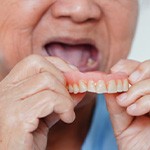
Remove your dentures and thoroughly rinse them off after every meal to wash away food debris and prevent accumulations of plaque. Remember to never use hot water, as this can warp the bases of your appliance and ruin the way it fits.
Clean Your Restoration

You should give your dentures a thorough cleaning at least once a day by using a soft-bristled brush and a small measure of denture cleanser, mild dish soap, or unscented hand soap. Remember not to use regular toothpaste, as it is too abrasive and can leave scratches in your appliance. If you aren’t wearing your dentures again immediately, store them in a clean container filled with water or an approved denture-cleaning product to prevent them from drying out. Always rinse your dentures before wearing them again since these cleaning products are not meant to be swallowed.
Keep Your Dentures Safe

Before you remove your dentures for cleaning, fill the basin of your sink with lukewarm or room-temperature water and cover the countertop with folded towels to provide a cushion in case you drop them. Always remember to keep your dentures safe from the reach of pets and small children.
Remove Dentures When You Sleep
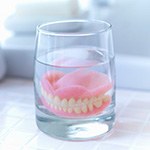
Your mouth needs at least eight hours away from your dentures every day so it can rest and clean itself, so most patients remove and soak their appliances before they go to bed. Wearing your dentures continuously can make you more vulnerable to soft-tissue irritation, gum disease, and possibly pneumonia. Soaking your dentures while not wearing them will prevent them from drying out and losing their fit.
Notice Changes
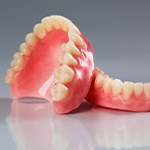
Pay attention to your mouth and dentures so you can report any changes to Dr. Neil. Mouth sores and gum irritation may be signs of infection that needs to be addressed. If your dentures are showing signs of not fitting properly such as shifting or clicking, it may need to be relined or replaced. Never attempt to repair or adjust your own dentures, as this can damage them further.
All-on-4 Dentures
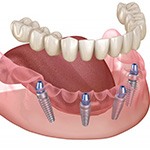
Brush your All-on-4 dentures twice a day with a soft-bristled electric or manual toothbrush and a small amount of non-abrasive toothpaste, but refrain from using toothpaste with baking soda or other stain-removing ingredients. It’s also important to floss your false teeth at least once a day, and you can use floss threaders to clean beneath your appliance more easily. You may find that a water flosser is the best way to keep your dentures and dental implants clean and healthy, and sculus brushes that are one-third the width of normal toothbrushes may make it much easier to clean between your appliance and your gums. You should also rinse with antibacterial mouthwash daily to prevent the accumulation of tartar.
Denture FAQs
Should I Have All My Teeth Pulled to Get Dentures?
Repairing a damaged tooth whenever possible is always preferable to replacing it. Tooth extractions of any kind will only ever be recommended if deemed absolutely necessary, like when a tooth is too damaged to save thanks to extensive decay, severe infection, or trauma that’s broken off most of the enamel. If all of the teeth in an arch are decayed or infected with gum disease, replacing them with dentures may be a viable option, but Dr. Neil will always explore all other options first.
Can I Sleep with My Dentures?
Dentists generally recommend taking your dentures out at night when you go to bed. When you first get your dentures, you will typically be told to keep them in your mouth for 24 hours, including when you sleep. After this, you should be taking them out every evening. This is because wearing dentures restricts the circulation in your gums, leading to soft tissue irritation and potentially speeding up ridge resorption. Taking dentures out gives the gums a chance to recover and get the nutrients they need during the night. The dark moist space beneath the teeth is an ideal place for bacteria to thrive, so sleeping with dentures has also been found to be associated with a higher risk of pneumonia. Ultimately, it is a good idea to take out your dentures when you catch some Z’s.
Will It Hurt to Get Dentures?
If you need to have teeth extracted before you can get dentures, you may experience some discomfort during the healing process. Be sure to take recommended over-the-counter and prescribed pain relievers as directed. After about 3 to 5 days, discomfort should improve. When you first get new dentures, some minor irritation may occur while your mouth adjusts to the new appliance. If you switch to a new set of dentures, this adjustment period may take longer than before. If pain persists, give us a call!
Can You Still Eat Steak with Dentures?
Tough meats, like steak, can be difficult to chew with dentures, but it’s still possible to do so if you take all the right precautions. Select tenderloin and other beef cuts that don’t contain as many connective tissues or muscle fibers. Make sure the meat is thoroughly tenderized beforehand. Cut the meat into small, manageable pieces so they are easier to chew.
